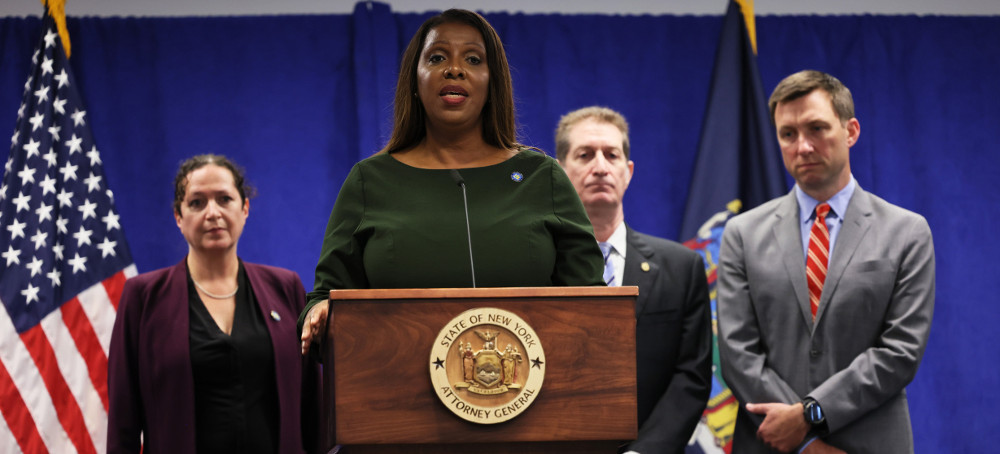New York Civil Fraud Suit Could Bring Down the Trump Organization
Hugo Lowell Guardian UK 'Trump thought he could get away with the art of the steal, but today that conduct ends,' Letitia James said. (photo: Michael M Santiago/Getty)
'Trump thought he could get away with the art of the steal, but today that conduct ends,' Letitia James said. (photo: Michael M Santiago/Getty) New York Civil Fraud Suit Could Bring Down the Trump Organization
Hugo Lowell Guardian UK
Restrictions sought by Letitia James include bans on Trump and his children that would tear his real estate empire from his control
The former US president, as well as Donald Trump Jr, Ivanka Trump and Eric Trump, were named as defendants in a sprawling 214-page complaint filed by New York attorney general Letitia James for allegedly falsely inflating his net worth by billions to enrich himself and secure favorable loans.
“For too long, powerful, wealthy people in this country have operated as if the rules do not apply to them. Donald Trump stands out as among the most egregious examples,” James said in a statement. “Trump thought he could get away with the art of the steal, but today that conduct ends.”
The restrictions being sought by the New York attorney general include permanent bans on Trump and his three children from serving as executives in any company in New York, a move that would tear the Trump Organization away from his personal control.
The other penalties being sought would prevent Trump from attempting to circumvent that principal restriction to establish his business under a different guise: James is also seeking to bar Trump from acquiring commercial real estate and applying for loans in New York for five years.
Trump could also lose two loyal executives named in the suit – Trump Organization’s chief financial officer, Allen Weisselberg, and its controller, Jeffrey McConney – with James asking the New York state supreme court to bar them from serving in top roles of any company in New York.
The New York attorney general may not succeed in securing all the penalties. But even some of the restrictions would spell the end of Trump’s family business – headquartered in New York and run alongside his children – while any federal charges would complicate re-establishing it elsewhere.
At a news conference on Wednesday, James confirmed that her office had made a criminal referral to justice department prosecutors with the southern district of New York and the Internal Revenue Service to investigate what she believed to be violations of federal statutes.
“We believe the conduct alleged in this action also violates federal criminal law, including issuing false statements to financial institutions and bank fraud,” James said, though she did not clarify the exact nature of potential bank fraud specified in the referral.
The referral to federal prosecutors involved the New York attorney general’s office compiling evidence of those specific alleged crimes in a “package” that would be sufficient to immediately open a criminal investigation, according to a person directly familiar with the matter.
The suit marks the culmination of a years-long investigation by James and though it is not a criminal prosecution, the referral to the justice department marks additional, unforeseen legal peril for the former president and his three adult children.
It adds to the lengthening list of legal woes facing Trump – from the justice department probe into his unauthorized retention of government records at his Mar-a-Lago resort to the January 6 investigation – as he has repeatedly suggested he will seek to run again for president in 2024.
The former president and his attorneys have castigated the New York attorney general’s investigation as a politically motivated witch-hunt, a refrain that has become his default position whenever he comes under scrutiny, and insist that the Trump organization did not operate illegally.
“Today’s filing is neither focused on the facts nor the law – rather, it is solely focused on advancing the attorney general’s political agenda,” Trump’s lawyer, Alina Habba, said in a statement. “We are confident that our judicial system will not stand for this unchecked abuse of authority.”
In the 214-page complaint, James outlined an extensive record of alleged wrongdoing, such as fraudulently inflating the value of 23 Trump-owned properties, including his Mar-a-Lago resort in Florida, Trump Tower in New York and what was previously the Trump International Hotel in DC.
The sprawling suit, which stems from the 2018 testimony to Congress by Trump’s former personal lawyer Michael Cohen, alleges decades of deceptive practices that amounted to more than 200 examples of false or misleading asset valuations that were knowingly used on financial statements.
Among myriad examples detailed in the suit, the state alleged the former president falsely inflated the square footage of his triplex apartment in Trump Tower from 10,996 to just under 30,000, which allowed him to claim it was worth $327m.
But, James said in a statement, “that price was absurd given the fact that at that point, only one apartment in New York City had ever sold for even $100m … In the 30-year-old Trump Tower, the record sale at that time was a mere $16.5m.”
The suit also alleged that Trump’s Mar-a-Lago resort was valued at $739m on the false premise that it was unrestricted property that could be developed for residential use, even though Trump had himself signed deeds donating those rights, meaning it should have been valued closer to $75m.
